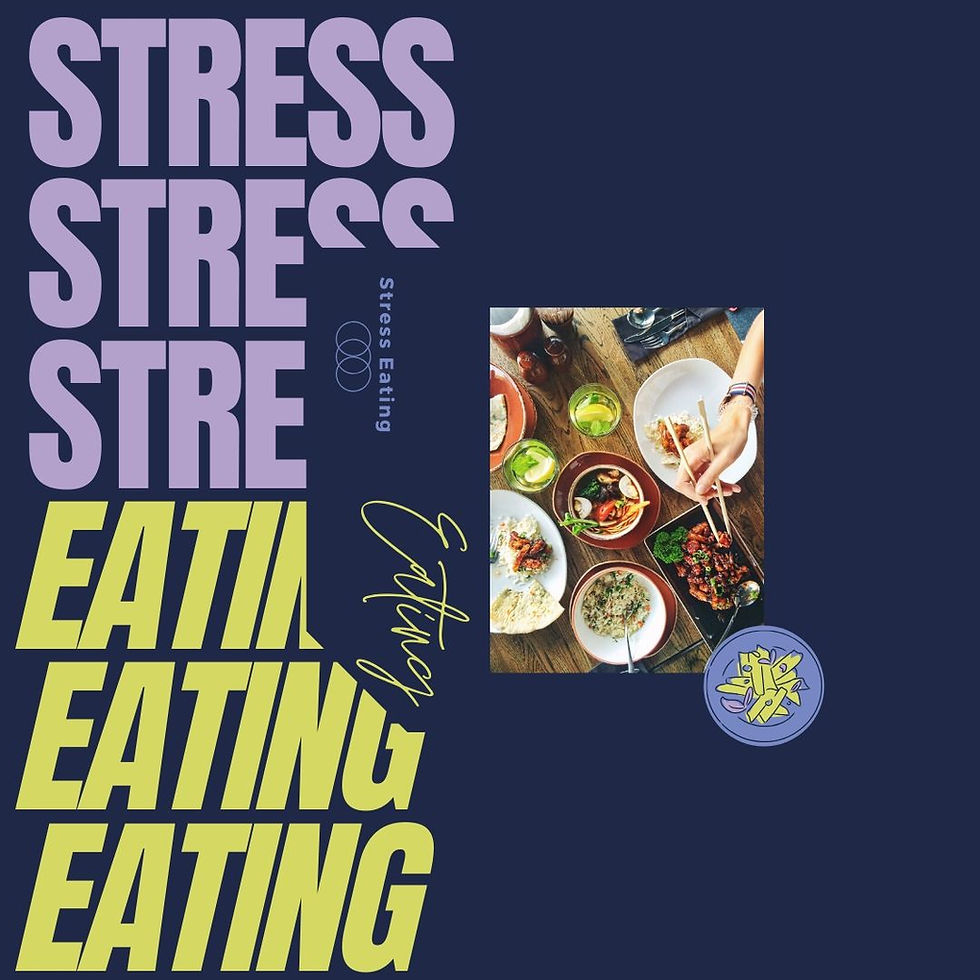Stress Eating
- TeenToTeen

- Jun 26, 2020
- 4 min read

In the midst of this pandemic world, stressing about the state of current events and of the uncertainty of it all seems to be unavoidable for many. It poses the question: how does one deal with stress? I know that for me, being at home during quarantine, when I need comfort or I want to procrastinate from my math homework, I’ve fallen into a pattern of searching my pantry for food. And this habit that I’ve developed isn’t rare; it can be known as stress eating or emotional eating. Stress eating is the act of eating in response to persisting stress, or a difficult emotional situation. It can be a way to cope, a distraction, or a way to relieve one’s stress (Scott, 1). This can be completely normal, and is certainly a shared experience for many during this pandemic.
So, why do people stress eat? According to Harvard Health Publishing, short-term stress, for example, a day’s exam, actually prompts your body to produce the hormone epinephrine, which prompts a “revved-up psychological state that temporarily puts eating on hold” (1). While worrying about the exam for a single day may not make you want to eat more, it’s different if you worry about this exam for days, or for weeks on end. In that case, our bodies produce a different hormone, cortisol, that generally increases motivation, and increases appetite (Harvard Health Publishing, 1). Emotional eating, which is slightly different from stress eating, is eating when you’re upset, or when you need a distraction. If you’re eating when procrastinating from math homework like me, you’re eating in response to your emotional state, not your physical state of hunger (Smith, 1). How can one determine if they are a stress eater? Help Guide suggests that you ask yourself the following questions: Do you feel powerless or out of control when you’re around food? Do you reward yourself with food? Do you eat to feel better? If the answers to these questions are yes, you most likely eat due to stress or emotions (Scott, 1).

The most important part is recognizing if stress or emotional eating is bad. There isn’t a clear answer to this, except that it depends on each individual. According to Harvard Health Publishing, researchers have linked weight gain to overeating, partly because of speculation that stress causes people to have a tendency to pick food higher in sugar and fat levels. These foods are often known as “comfort foods,” and can serve to counteract the stress that people feel. Of course, many stressed-out people also don’t get enough exercise or sleep, which can lead to weight gain as well. But with all of that being said, our society often shames and chastises people for gaining weight, which plays into the harmful and untrue stereotype that people should want to be skinny. For the most part, if eating helps you relieve stress, and does more good than harm, then it’s completely fine to go search for those comfort foods. However, it’s also of the utmost importance to understand what you’re doing, and the reason that you might be stress eating. After stress or emotional eating, many have the tendency to be upset about overeating, which restarts the cycle of being stressed (Smith, 1). Ensuring that you understand why you are stressed, and why you might be in search of those midnight snacks is very important. It’s also critical to ensure that eating is not the only way you know how to relieve stress. While those potato chips in your cabinet can certainly make you feel better, they don’t address the real roots of your problems. Writing down your thoughts or, if you can, talking to someone about how you feel, can be a more effective way to process and compartmentalize the struggles you go through.
If stress eating is one of your habits, don’t worry too much. One can learn to stop stress eating, or stress eat in a more healthy, moderate way. To stress eat in moderation, you can start questioning yourself when you go to the kitchen to eat more: “Could I wait to eat for five minutes, or is it really hunger?” and “Why do I want to go eat?” are great examples. Doing this could help you identify the root of your stress eating, and help you stress eat in moderation (Scott, 1). Additionally, eating healthier foods instead of those potato chips during a binge would be more beneficial for your body. You can also find other ways to relieve stress such as mediation, taking a brisk walk, reading a book, or doing anything that makes you feel content and forget about your emotions for a little while.
As we navigate this new and unforeseen world of COVID-19, remember that you’re not alone. Stress, and stress eating, is very common during these unprecedented times. Whether it’s seeking out those midnight snacks, or writing in a journal, it is critical to process these times, and to understand and work through stress. Being there for one another, and reaching out to friends and family is a great way to help yourself process this situation. So, whether it’s hanging out with your friends over zoom, or that healthy snack in the fridge: remember to find time for yourself away from the stress of it all.
Works cited
Harvard Health Publishing. “Why Stress Causes People to Overeat.” Harvard Health, Harvard Medical School, 18 July 2018, www.health.harvard.edu/staying-healthy/why-stress-causes-people-to-overeat.
Scott, Jennifer R. “How to Stop Eating When You're Not Hungry but Stressed.” Verywell Fit, Verywell Fit, 17 Aug. 2019, www.verywellfit.com/what-is-emotional-eating-3495967.
Smith, Melinda, et al. “Emotional Eating and How to Stop It.” HelpGuide.org, Help Guide, Oct. 2019, www.helpguide.org/articles/diets/emotional-eating.htm.
Name: Brisa Kane
Editor: Katelyn Clark
Graphic Designer: Lisa Li-Liang



Comments